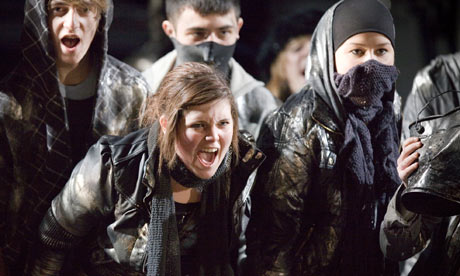 Julian Philips' "Knight Crew" had its premiere this past month, is described as a "new youth opera for 14-19 year olds," and is available for download through Glyndebourne. It's a retelling of Arthurian myths in two acts, with the theme of--wait for it--gang violence at its center. King Arthur meets West Side Story? The "Knight Crew" are deadly enemies of the Saxons, and Art kills a Saxon in the battle which functions as his initiation (after which he is haunted, like Richard III, by a chorus accusing him of his bloody deed.) To be honest, I was more intrigued than enthused by the premise. Putting my defensiveness of my beloved King Arthur legends aside, though, I have to admit that a gritty, urban adaptation of the basic outlines of Arthur's political rise and fall (mostly taken, it would seem, from Malory and the Matter of Britain) makes for a story that--like the originals--raises challenging questions about the nature of loyalty, cultures of violence, and the foundations of legitimate authority. Photos of production rehearsals may be found here.
Julian Philips' "Knight Crew" had its premiere this past month, is described as a "new youth opera for 14-19 year olds," and is available for download through Glyndebourne. It's a retelling of Arthurian myths in two acts, with the theme of--wait for it--gang violence at its center. King Arthur meets West Side Story? The "Knight Crew" are deadly enemies of the Saxons, and Art kills a Saxon in the battle which functions as his initiation (after which he is haunted, like Richard III, by a chorus accusing him of his bloody deed.) To be honest, I was more intrigued than enthused by the premise. Putting my defensiveness of my beloved King Arthur legends aside, though, I have to admit that a gritty, urban adaptation of the basic outlines of Arthur's political rise and fall (mostly taken, it would seem, from Malory and the Matter of Britain) makes for a story that--like the originals--raises challenging questions about the nature of loyalty, cultures of violence, and the foundations of legitimate authority. Photos of production rehearsals may be found here.Although the diction was fine enough to enable me to pick up nearly everything, I would have liked to have a copy of the libretto, adapted by Nicky Singer from her novel of the same name. The repetition of key phrases became occasionally wearing (wouldn't clearer leitmotifs have worked at least as well?), and veered from the provocative or poignant to embarrassingly trite. "I thought the future was for others" -- interesting. "If we remember they do not die" -- oh, honestly. According to the author's own website, reviews compared it (favorably) to "Mamma Mia!" and called for a West End transfer. I am happy to report that I noticed no points which invited comparison with "Mamma Mia!" Although there were moments where the eerie, possibly overly portentous chromaticism of Philips' orchestration gave way to intervals reminiscent of "rock opera," these were fortunately few. (All right, all right, I'm a snob! I'm sorry! I've enjoyed "Les Mis" in my time, as well as a sadly short-lived musical adaptation of "Tale of Two Cities," but I am the annoying person who gets so irritated by friends' rhapsodic praise of "Phantom of the Opera" that she breaks in with "Did you know Puccini's estate successfully sued...?" Doubtless this represents a failing in character.)
The characters appear in surprising incarnations: a bag lady named Myrtle appears to be a conflation of Merlin and the Lady of the Lake (she lives by a canal.) Mordec is Arthur's domineering older brother, rather than his incestuously conceived son. Art seems to owe much to T.H. White's version of the boy-king as a decent, slightly fumbling idealist ("I don't get it" is one of his repeated lines.) He was sung sympathetically by Canadian lyric tenor Pascal Charbonneau. Lance, appropriately enough in my mind, is a somewhat preppy youth with a motorcycle (Le Chevalier de la Harley?), and also a tenor. Without a libretto or score, it was sometimes difficult to keep track of the various members of the "knight crew" and their musical/textual characterizations, but the snippets on the website hint that such characterization was thought out, so my failure to pick up on it may be a result of less-than-ideal listening conditions. Still, it made for interesting listening, and was certainly rapturously received by its audience, whose hoots of acclamation were wild after each act. Opera against gang violence? All to the good.
No comments:
Post a Comment
Start a conversation!